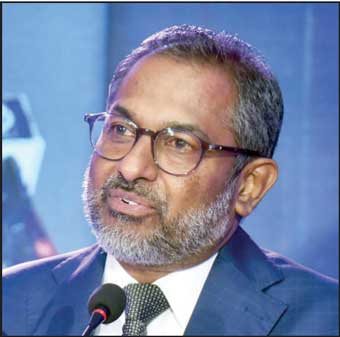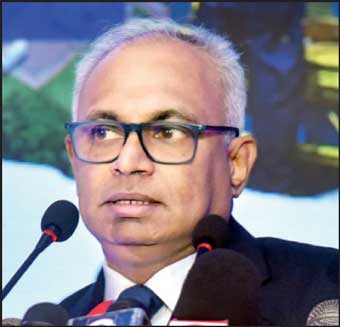Saturday Feb 21, 2026
Saturday Feb 21, 2026
Wednesday, 4 September 2024 00:34 - - {{hitsCtrl.values.hits}}
 |
| LTL Holdings Group CEO Nuhuman Marikkar |
 |
| LTL Holdings Group Deputy Chief Executive Officer Ravindra Pitigalage |
Bullish on growth and clean energy initiatives, Sri Lanka’s leading integrated power sector conglomerate LTL Holdings Ltd., yesterday announced Rs. 20 billion expansion project, funded through the country’s largest Initial Public Offering (IPO) to date.
Founded in the early 1980’s, LTL entered the industry with transformer manufacturing and supply chain initiatives and entered the power generation sector in the mid-1990’s capitalising on opportunities as the Government opened power generation to private sector investments.
The firm set an example by establishing Sri Lanka’s first Independent Power Producer (IPP) plant, a 25 MW facility which was completed in a record seven months. This marked the beginning of LTL’s extensive involvement in power generation with subsequent projects expanding to 100 MW, 300 MW and beyond.
Today, LTL has engineered and commissioned over 1,100 MW of power plant capacity globally including significant projects in Bangladesh, Nepal and Maldives, whilst having plans for expansion in Africa.
Future pipeline of projects include power generation initiatives, expansion of manufacturing facilities in overseas markets and exploration of upstream opportunities in LNG infrastructure.
The IPO is now open for subscription, making a significant milestone in LTL’s growth strategy. The funds raised will primary support two major projects — Rs. 13.5 billion will be utilised to part finance the equity investment towards the construction of a 350 MW combined cycle power plant in Kerawalapitiya (Sahasdhanavi Ltd.), which would be the second power plant to operate on LNG in Sri Lanka and Rs. 6 billion towards investing in a 50% equity stake in the 100 MW Siyambalanduwa Solar Power Project Rividhanavi Ltd.
The IPO offers 22.3% stake or 1,379,310,400 new ordinary voting shares at an issue price of Ra. 14.50 per share and aims to raise Rs. 16 billion, with a green shoe option to increase the total to Rs. 20 billion. The joint managers and financial advisors to the issue are NDB Investment Bank Ltd. The official opening of the IPO is 10 September, but investors can subscribe to it now.
The company is expanding its portfolio with a strong emphasis on clean energy initiatives. In addition to power generation, LTL operates as an Engineering, Procurement and Construction (EPC) contractor and handles Operations and Maintenance (O&M) services for power plants. The company is also involved in manufacturing power distribution equipment and heavy engineering. It holds significant market share in transformer manufacturing and galvanising operations with exports to over 30countries, including strong presence in South Asia and Africa.
“We are in every segment of the power sector value chain. We are proud of what we have achieved over the past four decades and we look forward to continuing our role as a leader in Sri Lanka’s energy sector,” LTL Holding Group CEO Nuhuman Marikkar said, extending an invite to the public to be part of its success story.
“This IPO is an opportunity for the public to be part of our success story and benefit from our expansion,” he added.
The Group CEO also highlighted LTL’s pioneering use of Heavy Fuel Oil (HFO) in gas turbines, a decision that saved Sri Lanka over Rs. 130 billion and reduced petroleum import costs by around $ 350 million.
He said this innovation was described as a calculated risk that paid off due to the company’s technical acumen and commitment to practical engineering solutions.
Marikkar detailed LTL’s plans to further expand its power generation capacity including a 350 MW LNG power plant in Kerawalapitiya, noting that it is part of a broader strategy to establish a 1,000 MW power hub at the same location aiming to attract LNG suppliers and boost energy infrastructure.
Noting that the company’s portfolio has diversified to include renewable energy projects, such as small hydropower plants and solar power installations, Marikkar revealed the firm recently expanded its footprint in Nepal with a 10MW hydropower plant, whilst targeting cross-border power sales opportunities, particularly to India.
LTL Deputy CEO Ravindra Pitigalage said the conglomerate’s comprehensive role in the energy sector, highlighting the stability offered by LTL’s long-term Power Purchase Agreements (PPAs) which average 14 years.
“These agreements provide a guaranteed revenue stream, ensuring reliable returns for investors. Around 40% of our Group revenue over the past four years came from fixed capacity charges, independent of actual power dispatch,” he explained.
In addition, he pointed out that many of these contracts include foreign currency payments, particularly Euro and US dollars, offering a hedge against local currency depreciation.
Pitigalage also said LTL is exploring the possibility of boosting LNG power generation in partnership with India’s Petronet LNG, which could significantly reduce energy costs and improve environmental sustainability.
He reassured the potential investors that the IPO valuation does not account for these future projects, suggesting additional upside potential. “Rs. 14.50 per share is only based on our existing operations. Any new projects will add further value to our investors,” he added. (CdeS)